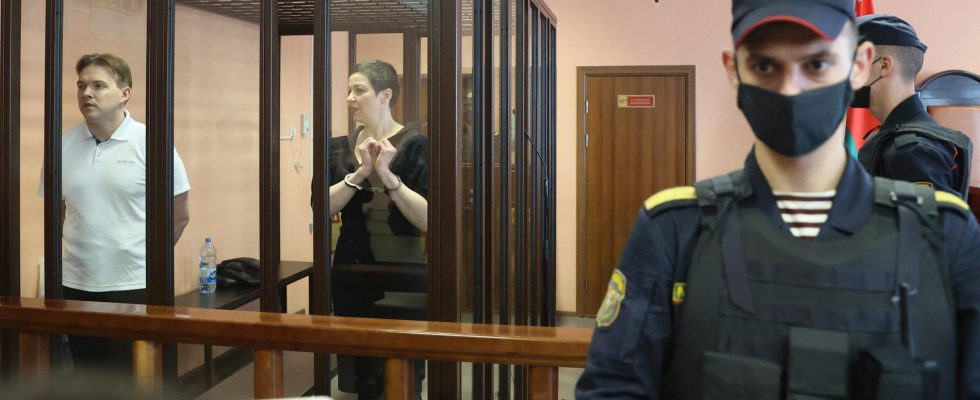unsaveSave
expand-left
full screen
chevron-rightnext
Activist Maria Kolesnikova and lawyer Maksim Znak in court in Minsk in September 2021. Both were sentenced to long prison terms for their roles in the 2020 protests.
1 / 2Photo: Ramil Nasibulin/AP/TT
In the shadow of Vladimir Putin’s Russia, repression is increasing in ally Belarus, often described as Europe’s last dictatorship.
As the country goes to what the regime calls elections, over 1,400 of President Aleksandr Lukashenko’s political opponents are behind bars.
It has been over a year since the last sign of life from Maria Kolesnikova. The democracy activist was sentenced in 2021 to eleven years in prison for his role in the 2020 mass protests against Lukashenko, which followed a presidential election rigged in the autocratic leader’s favor.
Kolesnikova’s relatives believe she is isolated in one of the country’s notorious penal colonies, writes The Guardian. The last letter to the family, on February 14, 2023, she ended with the words “everything will be fine”.
At least 1,430 political prisoners are currently being held in detention in Belarus, according to the human rights organization Vyasna. Among them are 2022 peace prize winner Ales Byalyatski and former presidential aspirant Viktor Babaryko.
Pressure on relatives
Nor has Svetlana Tikhanovskaya, who leads the Belarusian opposition from exile in Lithuania, heard from her imprisoned husband Sergei Tikhanovsky for several months. This week, Radio Free Europe/Radio Liberty reported that their imprisoned reporter Igor Losik has not contacted his family for a year.
“The authorities are not only trying to put pressure on the political prisoners – who are deprived of all contact with the outside world and kept in terrible conditions – but also on their families who are forced to live without any information about their loved ones,” Vyasna lawyer Pavel Sapelka told the AP last year.
In recent years, several political prisoners have died due to lack of adequate care. Last week, regime critic Igor Lednik died in a Belarusian prison.
Observers banned
Sunday’s parliamentary election is the first election in Belarus after the protests of 2020. Since then, Aleksandr Lukashenko’s autocracy has increased the oppression of the population day by day. Activists, human rights defenders, journalists and political opponents are persecuted, threatened, imprisoned and tortured. The country is falling on the world’s democracy index.
In the parliamentary elections, no forces critical of the regime are allowed and foreign observers are not welcome. The election is only aimed at consolidating Lukashenko’s iron grip on power, writes the intergovernmental democracy organization Idea in a statement.
In January, Lukashenko signed a law amendment that gives him criminal immunity for as long as he lives, AP reports. The law also prohibits opposition parties in exile from standing in future presidential elections.
FACT Background: Mass protests were crushed
Hundreds of thousands of people took to the streets of Belarus in the second half of 2020, after President Aleksandr Lukashenko declared himself the winner of the presidential election in August. According to the official figures, he received 80 percent of the vote, but the election results were quickly condemned by the opposition as well as large parts of the outside world and the population of Belarus.
The democracy movement was the most extensive that has expressed itself in the dictatorship, but the power apparatus was able to put down the protests with a lot of help from Russia. Prominent opposition figures were forced to choose between leaving Belarus or being imprisoned. Scores of people testified about how inmates were subjected to torture and sexual violence at the then overcrowded prisons in Minsk.
Aleksandr Lukashenko has ruled the former Soviet republic with an iron fist since 1994 and had long balanced between East and West to guard his own room for action. After the mass protests, he increasingly joined Vladimir Putin’s camp and has since forged stronger ties with Russia.
Most of the opposition work has continued abroad. Top politician Svetlana Tichanovskaya is a prominent figure in a democratic coordination council that operates in exile.
Read more
